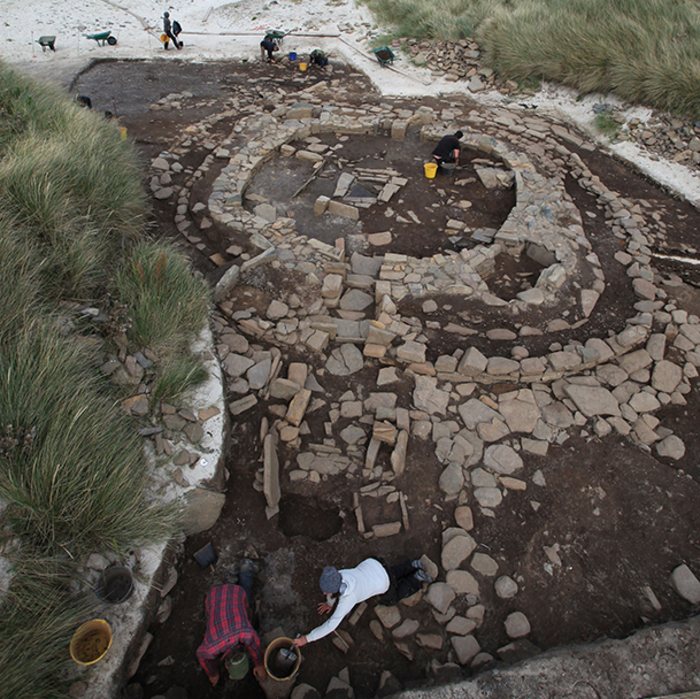AN INTERNATIONAL team led by researchers at the University of Huddersfield has used ancient DNA to rewrite the history of the Orkney islands to show that Orkney actually experienced large-scale immigration during the Early Bronze Age, which replaced much of the local population.

Credit: Graeme Wilson
AN INTERNATIONAL team led by researchers at the University of Huddersfield has used ancient DNA to rewrite the history of the Orkney islands to show that Orkney actually experienced large-scale immigration during the Early Bronze Age, which replaced much of the local population.
The project was a close collaboration between genetic researchers in Huddersfield and Edinburgh, led by Professor Martin Richards and Dr Ceiridwen Edwards, and archaeologists living and working on Orkney.
Orkney is world-famous for its archaeological heritage. Around 5000 years ago, during the Neolithic period when farming first took hold, it was a hugely influential cultural centre. With many superbly preserved stone dwellings, temples and megalithic monuments, and a style of ceramics that appears to have spread out across Britain and Ireland, it has even been described as “Britain’s ancient capital”.
Over the thousand years that followed however, as Europe moved into the Bronze Age, it has been widely viewed that somehow Orkney became left behind. Its influence dwindled and the islands became more insular. But with fewer archaeological remains to study, much less was known about this time.
By combining archaeology with the study of ancient DNA from Bronze Age human remains from the Links of Noltland site, on the remote northern island of Westray, researchers now know much more about this time than ever before, and the results have come as a great surprise to geneticists and archaeologists alike.
“This research shows how much we still have to learn about one of the most momentous events in European prehistory – how the Neolithic came to an end.”
Professor Martin Richards, University of Huddersfield
Firstly, despite the supposed insularity, the team has shown that Orkney experienced large-scale immigration during the Early Bronze Age, which replaced much of the local population. The new arrivals were probably the first to speak Indo-European languages, and carried genetic ancestry derived in part from pastoralists living on the steppe lands north of the Black Sea.
This mirrored what was happening in the rest of Britain and Europe in the third millennium BC. But the researchers found a fascinating difference that makes Orkney highly distinctive.
Across most of Europe, the expansion of pastoralists on the eve of the Bronze Age was typically led by men, with women being sucked into the expanding populations from local farming groups. But in Orkney the researchers found exactly the opposite. The Bronze Age newcomers were mainly women, while male lineages from the original Neolithic population survived for at least another thousand years – something not seen anywhere else. These Neolithic lineages, however, were replaced from the Iron Age and are vanishingly rare today.
But why was Orkney so different? Dr Graeme Wilson and Hazel Moore of the Orkney-based EASE Archaeology, who excavated the Links of Noltland, argue that the answer may lie in the long-term stability and self-sufficiency of farmsteads on Orkney, which the genetic data suggests may have already been male dominated by the peak of the Neolithic. When a Europe-wide recession hit towards the end of the Neolithic, they may have been uniquely placed to weather harsher times and maintain their grip on the population as newcomers arrived.
This implies that Orkney was much less insular than has long been assumed, and that there was a protracted period of negotiation between the indigenous males and the newcomers from the south, over many generations.
“This shows that the third-millennium BC expansion across Europe was not a monolithic process but was more complex and varied from place to place,” explained Dr George Foody, one of the lead researchers on the project from the University of Huddersfield.
The results have been surprising for both the archaeologists and geneticists on the team, although for different reasons: the archaeologists did not expect such large-scale immigration, whereas the geneticists did not foresee survival of the Neolithic male lineages.
The University’s Director of the Evolutionary Genomics Research Centre Professor Martin Richards said: “This research shows how much we still have to learn about one of the most momentous events in European prehistory – how the Neolithic came to an end.”
The research has been published by the official journal of the National Academy of Sciences (NAS) and is entitled ‘Ancient DNA at the edge of the world: Continental immigration and the persistence of Neolithic male lineages in Bronze Age Orkney’ by Katharina Dulias, George Foody, Pierre Justeau et al.
The work was part of a Leverhulme Trust Doctoral Scholarship programme awarded to Professor Richards and Dr Maria Pala, and the excavations at the Links of Noltland were funded by Historic Environment Scotland.
Journal
Proceedings of the National Academy of Sciences
Method of Research
Content analysis
Subject of Research
Human tissue samples
Article Title
Ancient DNA at the edge of the world: Continental immigration and the persistence of Neolithic male lineages in Bronze Age Orkney
Article Publication Date
7-Feb-2022




